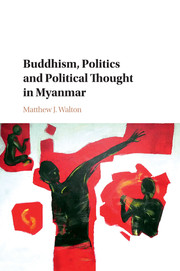Book contents
- Frontmatter
- Dedication
- Contents
- Acknowledgments
- A Note on Language and Usage
- Introduction
- 1 A Brief Political History and Cast of Characters
- 2 Building Blocks of a Moral Universe
- 3 On Human Nature and the Nature of Politics
- 4 Order and Freedom/Liberation: Purposes of Politics
- 5 What is “Politics” and What Constitutes “Participation”?
- 6 Discipline, Rights, and Morality: “Democracy” in Contemporary Myanmar
- Conclusion
- Appendix Glossary of Burmese and Buddhist Terms
- Bibliography
- Index
5 - What is “Politics” and What Constitutes “Participation”?
Published online by Cambridge University Press: 22 December 2016
- Frontmatter
- Dedication
- Contents
- Acknowledgments
- A Note on Language and Usage
- Introduction
- 1 A Brief Political History and Cast of Characters
- 2 Building Blocks of a Moral Universe
- 3 On Human Nature and the Nature of Politics
- 4 Order and Freedom/Liberation: Purposes of Politics
- 5 What is “Politics” and What Constitutes “Participation”?
- 6 Discipline, Rights, and Morality: “Democracy” in Contemporary Myanmar
- Conclusion
- Appendix Glossary of Burmese and Buddhist Terms
- Bibliography
- Index
Summary
There is no word or phrase in Burmese that approximates the meanings and implications of the English phrase “political participation.” The English term can include activities such as voting, running for office, contributing time or money to a campaign, organizing or attending a rally, signing a petition, or attending a public forum. It can also refer to actions that make the political aspects of everyday life recognizable as such, including debating a political issue with a neighbor, challenging racially biased hiring practices at a company, or insisting on more gender equity in housework. Chapter 3 included discussion of the multiple interpretations of the Burmese word nain ngan ye, which is almost universally used for “politics.” To most Burmese, the words for “politician” (nain ngan ye thama) and to “do politics” (nain ngan ye louk de) are associated almost completely with electoral or legislative politics and for many they also have strong negative connotations. Chapter 3 also noted the distinction between a more bounded and self-centered “party politics” as opposed to “national politics” (a-myo-tha nain ngan ye), which is what the military claims it engages in.
In the 1940s, political figures such as General Aung San attempted to raise the status of nain ngan ye, to change people's perceptions of the practice, and to expand it to include every aspect of human interaction, yet found mixed success. After independence, political leaders failed to construct a system hospitable to broader citizen participation, an atmosphere that military leaders used to their advantage. The political dysfunction of the parliamentary period in the 1950s paved the way for the military to rule for almost fifty years while paradoxically claiming that it was not “doing politics.” During that period the only opportunities for most citizens to “participate” in “politics” were through government-controlled civic organizations or occasional campaigns to oppose the military government.
Since 2011, Myanmar appears to be entering an era of renewed citizen participation in a system that is at least semidemocratic, decades after the failed 1988 uprising and Daw Aung San Suu Kyi's claim that “people's participation in social and political transformation is the central issue of our time” (1994).
- Type
- Chapter
- Information
- Buddhism, Politics and Political Thought in Myanmar , pp. 127 - 162Publisher: Cambridge University PressPrint publication year: 2016



